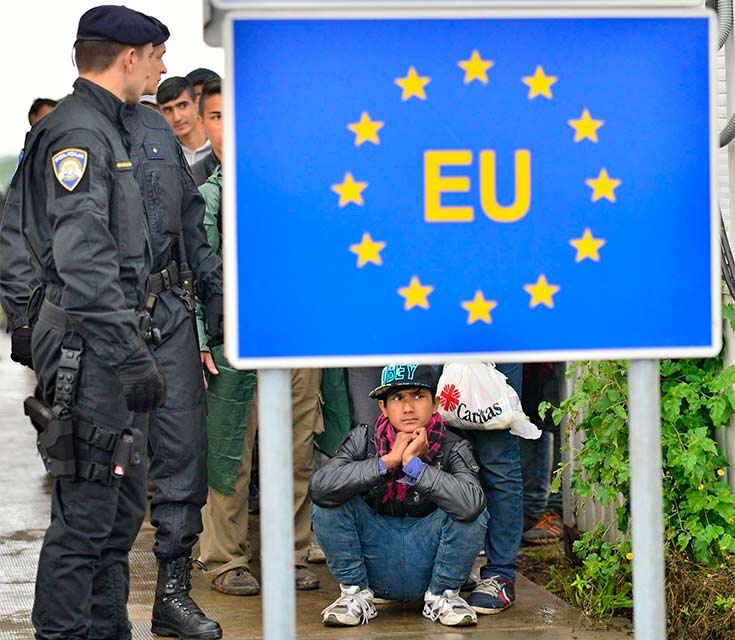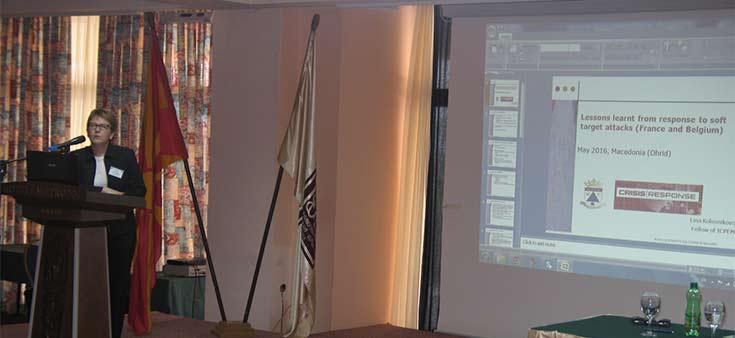Security challenges facing the Balkans
Editorial Advisory Panel Member Lina Kolesnikova reports on a conference that looked at crime in the Balkans, including human rights, the impact of the refugee crisis, growing fears of radicalisation in certain countries - just a few of the serious problems facing the Balkans today.
On May 30 – 31, 2016, the Seventh International Scientific Conference on Contemporary trends of Social Crime Control took place in Ohrid, the Former Yugoslav Republic of Macedonia. Lina Kolesnikova made a presentation entitled 'Lessons learned from the response to terrorist attacks in France and Belgium'.

There is a widespread feeling among the region’s people that the terrorist threat and the new migrant crisis are EU problems that have been 'dumped' on the Balkans (Radek Procyk / 123rf)
The other topics of this conference were:
-
Security between theory, politics and practice;
-
National and international perspectives of criminal justice and policing;
-
Crime science in the 21 century;
-
Rule of law and security challenges;
-
Media and crime;
-
Economic cost of crime;
-
Human rights and crime control;
-
Migration as a global and security challenge;
-
International Law and security;
-
Geostrategic restructuring in the international political order as a background to the migrant crisis;
-
Private and corporate security; and
-
Radicalisation on religious and ethnic grounds from the Middle East and Balkans perspectives.
Participants came from almost all countries of the former Yugoslavia (Serbia, Slovenia, Bosnia and Herzegovina, Croatia, Montenegro and the former Yugoslav Macedonia) and from Italy and Belgium.
There were number of presentations on current instability, radicalisation and the role of ISIS in the Balkans region. Several speakers insisted that the refugee crisis in Europe is just one of a series of problems confronting Balkan states today. Meanwhile, geopolitics and rivalries between large powers once again come into play. Russia has vital interest in keeping the Balkan countries out of NATO, while Turkey has become more active player in promoting its own interests.

CRJ Advisory Panel Member Lina Kolesnikova spoke at the event, discussing the terrorist attacks on France and Belgium
There were very interesting presentations on the increasing role of ISIS in the region. Speakers believe that there is an urgent need for better regional law enforcement and intelligence sharing co-operation, as well as for more communication and co-operation between security institutions of states in the region.
All speakers reminded delegates about special role of Balkans in combating this threat; the Balkans is a major route into Europe and a bridge for ISIS funding, supplies and recruitment. Recent arrests and trials in Albania, Bosnia-Herzegovina and Kosovo of fighters returning from Syria and Iraq have highlighted the real problem of trained and battle-tested individuals to regional security. The appearance of ISIS flags in Bosnian villages, the involvement of individuals from the region in terror plots in Sweden, Germany and Austria; and more importantly the links to actual attacks in Spain, France and in the region itself, all point to the urgency in increasing regional efforts to contain and eliminate this threat.
There were several presentations on increasing radicalisation over the last two decades. Speakers were concerned that the reality destabilised the Islamic traditions of the region, known for its secular character, historic tolerance and cultural integration. It is necessary to keep in mind that the Balkans are especially vulnerable for several reasons. Balkans society is ethnically diverse and multi-religious (which caused many of historic conflicts). Most of the states in the region have very unstable political situations, weak governments and or civil institutions. Economic crises and high levels of corruption make the whole situation even worse. The region is experiencing very high unemployment among its young people, which helps terrorist groups.
Balkans states have very weak institutions and are often ruled by ambitious individuals rather than laws. The legacy of large militaries and recent wars have left large quantities of weapons, explosives and ammunition that have filtered into the black market through corruption and organised crime networks. There is also a widespread feeling among the region’s people that the terrorist threat and the new migrant crisis are EU problems that have been 'dumped' on the Balkans. Several presenters also addressed problems of smuggling of people, arms, cigarettes and drugs.
Lina Kolesnikova, 06/06/2016